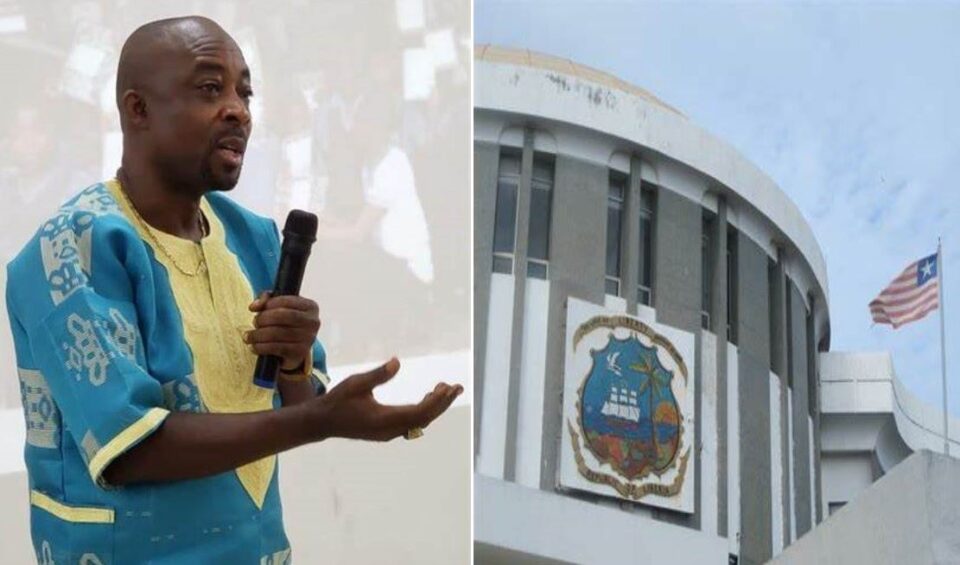HOTO: Eddie Jarwolo, Naymote’s Executive Director next to Capitol Building, the seat of the Liberian Legislature
Findings/Recommendations: The legislature implements immediate institutional reforms to strengthen its various oversight committees and establish the appropriate systems for transparency, and accountability, including limiting “executive/secret” sessions to only matters with serious implications for national security and defense as required under the law.
The institution sets up a functional website and ensures voting records of members of that body are made public and available to effectively assess the performance of its members.
FOR IMMEDIATE RELEASE
Legislative Performance Report
Monrovia, Liberia – September 9, 2024- Naymote Partners for Democratic Development is pleased to release its midterm legislative performance report which covers the period January to July 2024.
During this period, the House and Senate performed their three critical functions of lawmaking, oversight, and representation. In performing these roles, either the House or the Senate has to undertake a series of compelling actions.
During the period under review, statisticians from both chambers reported a total of 122 sittings, including seventy-three (73) regular sittings (38 House and 35 Senate), twenty-eight (28) executive/secret sittings held by the House, with the Senate holding none, two (2) Special Sessions, were called for, by the President of Liberia in April and nine-teen (19) extraordinary sittings, (10 House, 9 Senate).
During the period under review, the House of Representatives passed 4 bills into law, while the Senate passed 2 bills into law. There are 6 bills that came from the Executive or the presidency that were passed into law. 50% of the total bills passed came from the President’s office. There were 34 public hearings held by the House as recorded, with July recording the highest number, 9. The month of January had no hearings. Senate Chamber statistics show that 893 executive officials were confirmed by the Liberian Senate.
The Liberian Legislature has 103 members, comprising 73 members of the House of Representatives (HOR) and 30 members of the Senate. The HOR consists of 65 males and 8 females, while the Senate consists of 27 males and 3 females. The Legislature appropriated US53,376,575.00.
With the 55th Legislature now seated, it is equally anticipated that the current legislature will embrace and execute crucial reforms. This will be needed to strengthen its institutional capabilities in exercising oversight, promoting inclusion, and advancing democracy and accountability.
Like previous Legislative Digests, Naymote and its collaborating institution, the Legislative Information Service, (LIS) conducted desk reviews, reading newspapers, government publications, national budgets per year, and popular opinions about the Legislature.
Secondly, Naymote conducted a Key Informant Interview, (KII) to collect information from several persons from both Houses including staff of lawmakers, lawmakers, and professionals working in the legislature who have firsthand knowledge about the Liberian Legislature.
A study of closed and open-ended questionnaires was administered for the KII, data were collected and analyzed, verifications were made on the information collected and a final report was produced for publication.
Based on the findings of this report, Naymote recommends the following:
The legislature implements immediate institutional reforms to strengthen its various oversight committees and establish the appropriate systems for transparency, and accountability, including limiting “executive/secret” sessions to only matters with serious implications for national security and defense as required under the law.
The institution sets up a functional website and ensures voting records of members of that body are made public and available to effectively assess the performance of its members.
That, with system audits––that are either underway or have ended at the House of Representatives or the Senate, each House must ensure that full-scale audits are conducted as the General Auditing Commission (GAC) may deem appropriate and consistent with its Act.
The legislature provides the necessary tools or digital applications to enhance the grossing clerks’ and stenographers’ data collection and reporting skills to foster legislative openness and effectiveness.
The Joint Public Accounts, Expenditures and Audits Committee will be supported to host town hall meetings, and public engagement, and use social media platforms to educate citizens about the ongoing works, prospects, challenges, and recommendations to ensure accountability and transparency in the management of public funds, etc.
The legislature makes a deliberate effort to support constitutional reforms in support of affirmative action that increases the proportion of women in both Houses.
The legislature, as part of its oversight responsibilities, ensures ministries, agencies, and commissions (MACs) submit their regular quarterly and annual reports to the public.

